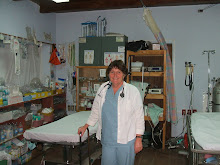


Words by Mike
Day two in the urgent care tent. I counted 97 patients seen by myself, Emily and Rick, our uber pediatrician from Los Angeles. A smaller crowd than yesterday. We have tried to apply some simple order to the tent, everything in place before the doors open to the throng waiting patiently outside at 7:30, a triage person taking vitals and simple history, a numbering system for the patients, etc. But the forces of disorder and disorganization are relentless. It began with no "papier" on which to write notes and minutes lost trying to make copies, then endless lack of various this and thats, people jumping the queue while dozens resignedly wait on the benches. Periodically something dramatic presents itself, an asthma attack or a head wound which is ushered through to the ER. Medicine is something of a spectator sport here, the bench people listen avidly to the clinical details related by the patient at the doctors "desk", a crooked tray table cum folding chair. I don't inquire about the comments and jests coming from the gallery.
Some of the patients problems are straightforward, but management never is. Doctors may have been seen before, but there is never a diagnosis by history. Medicines may have been given, but they are unknown. Patients always run out of medicines. But they have no money, and to get a medicine refilled for free requires a long trip to the hospital and a half days wait. Everyone over forty seems to have uncontrolled hypertension. Some tests may be ordered but generally require another visit for "results". Many simple tests are unavailable, even simple things like thyroid function. You can write prescriptions but the pharmacy may not have the medicine or you might have written "incorrectly" so virtually every RX generally requires me to walk down to the pharmacy to see what is there. Many problems result in consultations for nonexistent consultants. For example I've seen several large hernias. Supposedly a general surgeon is coming in two months, so all we can do is take the patient's phone number (or the number of the neighbor lady) and promise that they are being placed on a list to be seen. There are no urologists on the horizon. No ophthalmogist for my lady with the cloudy cornea and eye pain.
Everyone here has chest pain. They also have stomach pain, back pain, headache, palpitations, dizziness, and weakness. But they are worried about the chest pain. The EKG machine does not work. This had been the only available technology for assessing acute chest pain. If ischemia is likely we skip down to the end of the algorhythm and treat with the few medicines we have. But the majority of our chest pain patients have obvious and profound post traumatic stress disorder. You don't have to scratch too deep to encounter sadness, uncertainty, pain and deep anxiety. I think: what can be done for these people? So I walk down to the pharmacy and ask to see if there are any available psychiatric meds. There is a big bottle of diazepam. What else? A ha - I find a bottle of zoloft. Not much, but certainly enough to treat the unemployed school teacher aware enough to frankly write "depression" as his chief complaint. "Oh no no" said the pharmacist, "this (zoloft) is a very very strong and dangerous medicine and you should not give it to anyone."
Another universal complaint is epigastric pain. Haitians are an abstemious lot: few smoke or drink. Few can afford to buy NSAIDS (Ibuprofen). As they live in crowded conditions I suspect H. Pylori to be quite prevalent. But still, why so much epigastric pain? But today the pattern finally emerged. Most people describe a gnawing epigastric pain relieved by meals. Well then, I ask "how many meals a day do you eat?" The answer, in general, seems to be one. Some people eat two. I've yet to find a patient who eats three. And for some, the answer is "Sometimes one - sometimes none". Haiti is hungry. Very hungry.
Pictures: The super cute baby, Becky and Brad hard at work, the uber pediatrician Rich and the preemie.

Love the way your write. Keep it up. Our group (from Baltimore) is coming in late June. Can you help me get in touch with Dale your pharmacist? We would like to pick his brains regarding the medication situation, what we should bring, etc. MESI!
ReplyDeletemchaus@aol.com
yes the EKG machine does work, I have used it more than once. It needs to stay plugged in to keep the battery charged, and when you do the EKG you need to unplug it or you will get 60 cycle interferance. It does work, I hope someone reads this there in Haiti, I should have attached a note to the machine, but I forgot.
ReplyDelete